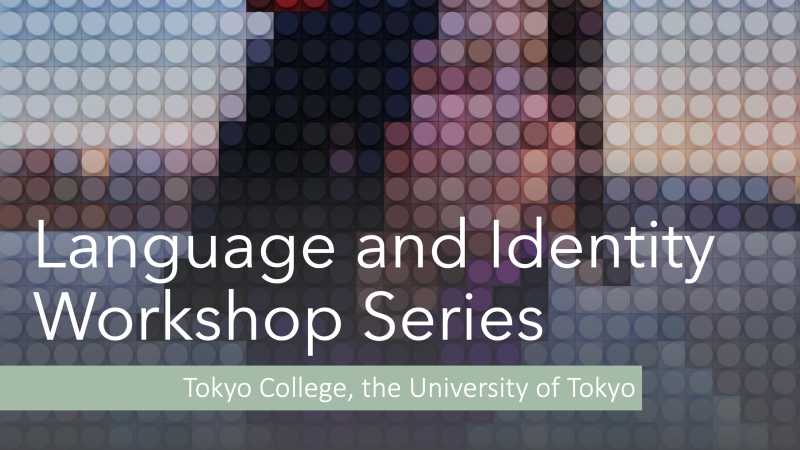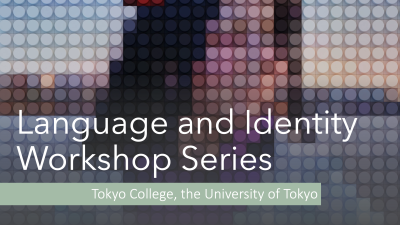Language and Identity Workshop IV. Language in Public Space: Identity and the Urban Environment

| Date(s) | Monday, 29 May 2023, 4:00-5:30PM |
|---|---|
| Venue |
Zoom Meeting (Register) |
| Registration | Pre-registration required |
| Language | English |
| Abstract |
LEE Tong King (Associate Professor, The University of Hong Kong) Choreographing linguistic landscapes in Singapore: Neat multilingualism and the affect of balance This talk introduces the public dimension of Singapore’s linguistic landscape, focusing on the language ideologies governing the constitution of official signage. Using a social semiotic approach, it identifies a visual–spatial formula operating across a wide range of official signs—a quadrilingual schema distributing relatively equal visual–spatial resources to each of the official languages in Singapore (Malay, Chinese, Tamil, and English). It will be argued that the schema serves as a discursive technology for choreographing Singapore’s linguistic landscape. It enacts the trope of neat multilingualism, which in turn evokes an affect of balance, speaking to an order of indexicality informed by the macrostructures of official language policy. Public signage therefore operates on a scale that perpetuates public narratives on multiculturalism. Adapting Michel de Certeau’s terms, it is argued that the resulting public landscape is akin to a multilingual place produced by technocratic semiotic templates from above rather than a multilingual space emerging from spontaneous linguistic energies from below. Recent years, however, have seen changes in this facet of Singapore’s linguistic landscape, with Singlish becoming more visible on public displays than before. This development points to an increasing commodification of the vernacular as an emblem of locale-specific identities as well as the dynamic negotiation of complex sociolinguistic realities in the polycultural global city.
Jackie MILITELLO (Adjunct Assistant Professor, The University of Hong Kong) Lamma: Signs of public alignment with, and individual resistance to, the Mainland Although a brief 30-minute ferry ride to Hong Kong’s intensely urban premier CBD, Lamma Island is primarily rural with small fishing villages and green mountainous hiking paths. But the main village Yung Shue Wan is at the urban/rural nexus (Militello et al. in press), with a cosmopolitan flair and dense flows of pedestrians linked to the ferry schedule. This ferry pier is a key public space. Here two displays of language show two competing identities of Hong Kongers’ relationship to Mainland China. One is the North Lamma Public Library (completed 2019) which features large scale stylized Chinese calligraphy from a Song Dynasty classical text on the face of the building. While the required esoteric knowledge of classical Chinese literature renders comprehensibility elusive even to educated Hong Kongers, a message is communicated to all. While providing ‘”atmospheric’ multilingualism” (Cook, 2013, p. 68) and reflecting the library function of the building, it also indexes a more Chinese oriented identity, aligning to Mainland China. Along the same ferry pier, is large official signage around a waste collection point. Here, graffiti has been hastily scribbled in English signaling opposition to the Chinese Communist Party. Similar graffiti during and after the protests exists (Lowe & Ortmann, 2022), but nearly exclusively in Chinese and quickly erased. While the official government linguistic landscape in public spaces displays a performative orientation to Chineseness and thus the Mainland, private individual Hong Konger sentiments resist this discourse in graffiti, which has a more-than-fleeting life in this highly public space. References: Lowe, J., & Ortmann, S. (2022). Graffiti of the “New” Hong Kong and Their Imaginative Geographies During the Anti-Extradition Bill Protests of 2019–2020. Critical Arts, 36(1-2), 1-19. Militello, J., Theng, A. J., Kong, Y. L. C., & Singh, J. N. (in press) The linguistic landscape of Lamma Island: Autoethnography, polycentricity, and the urban–rural nexus in Hong Kong. Sociolinguistic Studies.
Nadiya KISS (Postdoctoral Researcher, Justus Liebig University of Giessen) Displaced language: Ukrainian in the linguistic landscapes of German cities Based on the methodology of linguistic landscapes (further LL, Gorter 2018; Penycook 2018; Schmitt 2018) and semiotic landscape (Jaworski & Thurlow 2010) research, the article highlights recent changes in the LL of German cities. The paper will highlight collected by the author LL data in German cities and towns, mainly of Hesse land. Additionally, images from social media, especially from the groups of Ukrainians in Germany, are also included in the analysis (more than 650 pictures altogether). The presence of Ukrainian symbolics (flags and national colors) and language appeared as a reaction of the German society toward Russia’s full-scale invasion and the war against Ukraine. Forced mass migration, known also as the Ukrainian refugee crisis, transformed language surroundings in the German big cities, as well as in small towns and villages, where refugees are settled. Ukrainian language and symbolics are markers of identity (on the bottom-up level) and support (on the top-down level). They appear in public and semi-public spaces and are constructed by a variety of actors – state organizations, small and middle businesses, NGOs, and Ukrainian communities (formed by traditional diaspora, work migrants, and newcomers). Ukrainians in Germany actively form their places of belonging, enhanced with national symbols and language, interacting with the German authorities and society, and these processes are reflected in LL tokens. Therefore, following Backhaus (2007: 57) the paper will try to answer such research questions: 1) By whom are the LL tokens in Ukrainian in Germany constructed (official vs non-official items)? 2) For whom are such LL tokens in Germany constructed (who is the presumed reader)? 3) LL with Ukrainian language and symbols in Germany quo vadis? (what is the future of the Ukrainian language in Germany in particular and in the EU in general). References Gorter, D. (2018). Methods and techniques for linguistic landscape research: about definitions, core issues and technological innovations, In: Pütz, M., Mundt, N. (eds.) Expanding the Linguistic Landscape: Linguistic Diversity, Multimodality and the Use of Space as a Semiotic Resource, Bristol, Blue Ridge Summit: Multilingual Matters, https://doi.org/10.21832/9781788922166-009 Jaworski, A. and Thurlow, C. (2010). Introducing semiotic landscapes. Introducing semiotic landscapes. In A. Jaworski & C. Thurlow (eds), Semiotic Landscapes: Image, Text, Space (pp. 1-40). London: Continuum. Pennycook, A. (2018). Linguistic landscapes and semiotic assemblages. In: Pütz, M., Mundt, N. (eds.) Expanding the Linguistic Landscape: Linguistic Diversity, Multimodality and the Use of Space as a Semiotic Resource, Bristol, Blue Ridge Summit: Multilingual Matters, https://doi.org/10.21832/9781788922166-007 Schmitt, H. (2018). Language in the public space. An introduction to the linguistic landscape.
Jennifer DAILEY-O’CAIN (Professor, University of Alberta), Richard FEDDERSEN (Ph.D. Candidate, University of Alberta), and Grit LIEBSCHER (Professor, University of Waterloo) Identity and Interaction in the Linguistic Landscape Building on both research that investigates the ways that identity is constructed in spoken interaction (Antaki and Widdicombe, 1998; Bamberg, 2011; Deppermann, 2013) and research that highlights the linguistic landscape’s inherent interactivity (Backhaus, 2007; Pavlenko, 2009; Gaiser, 2021), we will examine how interaction is a crucial element in the creation of meaning and the construction of identities in the linguistic landscape. Our data is from two mid-sized German cities (Mannheim and Leipzig), and our analysis of that data will draw on the concept of turn-taking from conversation analysis (Sacks, Schegloff & Jefferson, 1974; Drew & Heritage, 2006) and introduce its counterpart in the linguistic landscape. Pairing turn-taking analysis with the principles of geosemiotics (Scollon and Scollon, 2003) and Blommaert’s (2013) Ethnographic Linguistic Landscape Analysis (ELLA), we will show that linguistic landscapes can consist of interlinked semiotic turns that proceed similarly to the turns of a conversation, and that as in spoken conversations, the ways that this turn-taking plays out in the linguistic landscape can also serve to construct group identities. References: Backhaus, P. (2007). Linguistic landscapes: A comparative study of urban multilingualism in Tokyo. Multilingual Matters. Bamberg, M. (2011). Who am I? Narration and its contribution to self and identity. Theory & Psychology, 21(1), 3–24. Blommaert, J. (2013). Ethnography, superdiversity and linguistic landscapes: Chronicles of complexity. Bristol, UK: Multilingual Matters. Deppermann, A. (2013). How to get a grip on identities-in-interaction: (What) does “positioning” offer more than “membership categorization”? Evidence from a mock story. Narrative Inquiry, 23(1), 62–88. Drew, P., & Heritage, J. (Eds.). (2006). Conversation analysis. Thousand Oaks, CA: Sage. Gaiser, L. (2021). Negotiating family language policy: The interplay of Arabic and English in Manchester. Elia, 2(21), 53–92. Pavlenko, A. (2009). Language conflict in post-Soviet linguistic landscapes. Journal of Slavic Linguistics, 17(1/2), 247-274. Sacks, H., Schlegoff, E., & Jefferson, G. (1974). A simplest systematics for the organization of turn taking in conversation. Language, 50, 696–735 Scollon, R., & Scollon, S. W. (2003). Discourses in place: Language in the material world. London, UK: Routledge. |
| Program |
16:00-16:20 (15 min. talk + 5 min. Q&A)
16:20-16:40 (15 min. talk + 5 min. Q&A)
16:40-17:00 (15 min. talk + 5 min. Q&A)
17:00-17:20 (15 min. talk + 5 min. Q&A)
15:50-16:00 |
| Speaker Profile |
Presenters LEE Tong King
Jackie MILITELLO
Nadiya KISS
Jennifer DAILEY-O’CAIN
Moderator HOSOKAWA Naoko |
| Organized by | Tokyo College, The University of Tokyo |
| Contact | tokyo.college.event@tc.u-tokyo.ac.jp |













